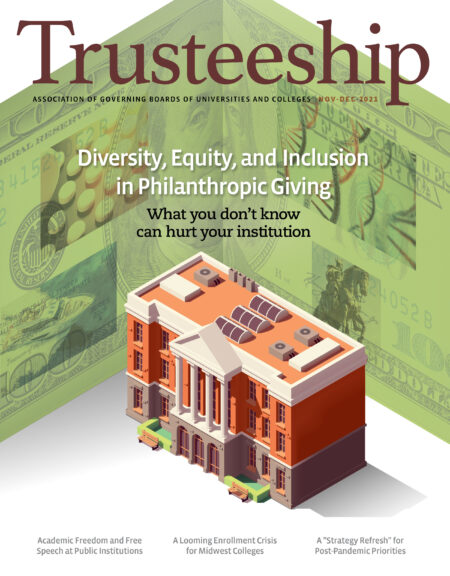
In this era of seemingly continuous challenges, it is imperative that boards know how to engage in difficult conversations about matters of institutional importance. Yet too often board members, wary of creating disagreements within the board and/or of potentially embarrassing colleagues by taking issue with their positions, avoid such conversations.
Consider these scenarios:
A trustee of an independent college, worried about the institution’s growing financial vulnerability, believes the board should explore partnerships or even merge with another institution. This board member remains silent, however, because of fears that by calling attention to the institution’s dismal financial outlook, they may be labeled as defeatist.
A board member of a public university system is concerned about whether the system is adequately protected from cyber risks. This board member does not raise the topic, however, partially due to insufficient knowledge in this area and partially to avoid causing undue concern during a public board meeting.
A new foundation board member recognizes that the pandemic has had a disproportionate effect on first-generation and low-income students. This board member has learned that some institutions and foundations are addressing this problem by funding micro-grants for students in need. This board member remains silent due to concerns that such a board-originated initiative would be overstepping the board’s responsibilities for oversight and not operations.
It is not always easy to have such conversations. One’s capacity to have courage and face disagreement is a muscle that needs practice, but it is necessary for the health of the institution, system, or foundation that the board oversees. Consider spending time outside of the board meeting learning about the rich higher education landscape. Doing so should give board members a working knowledge of and confidence to discuss critically important strategic issues.
Let me provide some suggestions for how AGB can help the reluctant board members described above.
First, matters of strategic, institutional importance should never be taboo. It is the board’s job to have conversations about financial health. Topics such as affiliations or even closure are well within the purview of the board to discuss. AGB’s book Higher Education Business Models Under Stress (AGB.org/BusinessModelsUnderStress) offers a compelling review of how boards can prepare for these kinds of events, focusing not only on the appropriate metrics to track but also on what goes into a transition such as affiliation or closure.
Second, board members can download and read AGB’s Cyber Risk Oversight for Higher Education Boards (AGB.org/Cyber-Risk) to incorporate practical guidance on the topic. This resource provides board members with sufficient knowledge and insights about the topic that they will feel comfortable raising it with the entire board (or at the very least, the board chair and the president). I should note that boards benefit from having members who have a diverse array of strengths and expertise—and have access to leaders with varied knowledge as well—including on issues such as cyber risk.
Third, when boards have cultivated a board culture of trust, board members will not be reluctant to suggest ways in which the institution might foster student success or function more effectively. In this regard, board officers and chief executives have important responsibilities for establishing a board culture that embraces such discussions and that allows for board members to be comfortable asking important but challenging questions. Trust is a keystone element of a successful board. Indeed, whatever the topic, the underlying assumption must be that board members are working together, in collaboration with senior staff, to chart a sustainable path forward.
If 2021 has taught us anything, it is to expect the unexpected. I suggest that board chairs ask their presidents and leadership teams to prepare a winter break reading list for board members that provide information pertinent to the institution’s strategic priorities for 2022 and beyond, and to prepare for tough conversations that may occur. Please note that AGB’s entire archive of publications is available to AGB members without cost.
As always, I encourage you to review the Principles of Trusteeship (AGB.org/Principles), our Board of Directors’ Statement on Justice, Equity, and Inclusion (AGB.org/JEI-Statement), and the articles in this issue of Trusteeship. AGB looks forward to serving you next year.
Henry Stoever, AGB President and Chief Executive Officer

